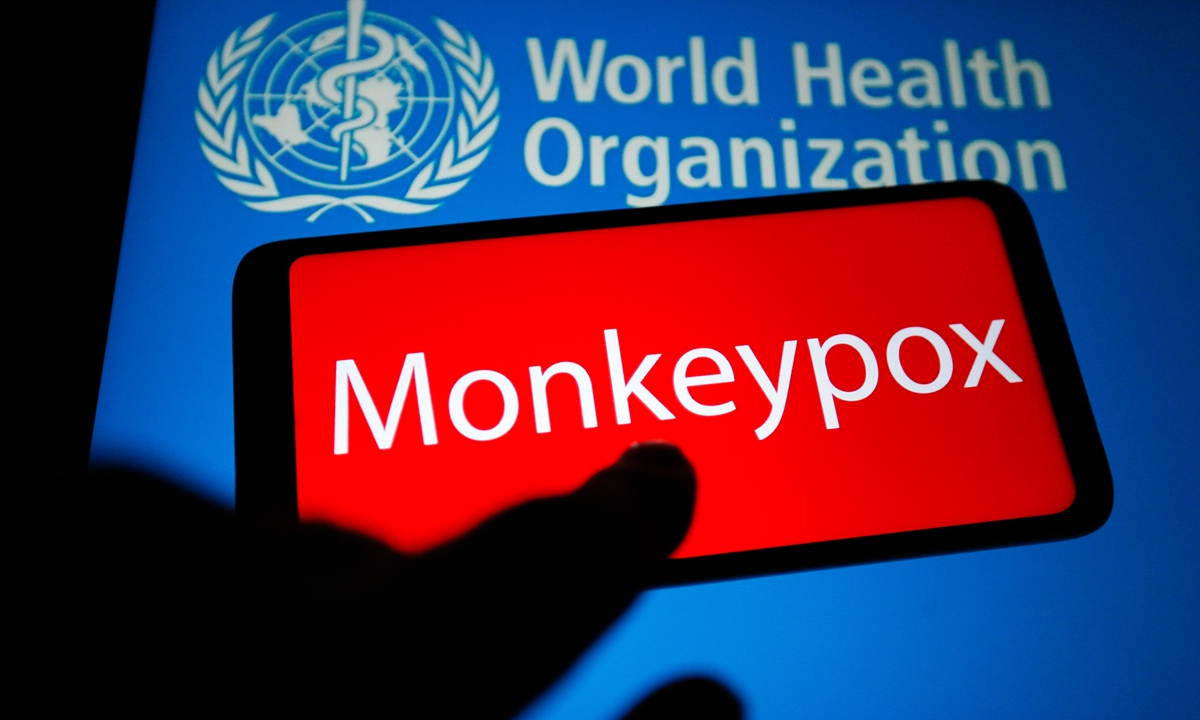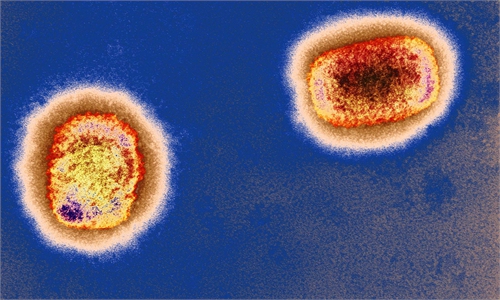Medical experts voice confidence in China to prevent big monkeypox outbreaks as WHO says infections not 'Public Health Emergency of International Concern'

Monkeypox Photo: VCG
The multi-country monkeypox outbreak does not constitute a Public Health Emergency of International Concern (PHEIC), announced the World Health Organization (WHO) in a statement on Saturday, as some 47 countries and regions have reported an accumulated 3,040 cases since May and the first imported case was found in China's Taiwan on Friday.
Chinese experts believe the WHO's judgment means that the risk of monkeypox spread across countries is not high and that mutations do not necessarily mean stronger transmission. They voiced confidence that China can control the virus spread in a timely manner and prevent large-scale outbreaks even if sporadic monkeypox-related cases are found in the country.
The decision was made on Thursday at an International Health Regulations (IHR) Emergency Committee.
While a few members expressed differing views, the committee resolved that the event does not constitute a PHEIC, which is the highest level of alert that WHO can issue, which so far has only been given to only six disease outbreaks since 2007, including COVID-19, Ebola, Zika, and the H1N1 flu, NBC News reported on Sunday.
However, the International Health Regulations (IHR) Emergency Committee advised the monkeypox outbreak should be closely monitored and reviewed after a few weeks, given the emergent nature of the event, according to the WHO statement.
The WHO's judgment of the disease is mainly based on its risk of spread across countries, and the capability of monkeypox virus spread at the current stage is not deemed strong, an expert from the Chinese Center for Disease Control and Prevention (China CDC), who requested anonymity, told the Global Times on Sunday.
The expert said that although it can be transmitted through the respiratory tract, monkeypox is mainly caught by getting into contact with the body fluids and blood of other infected persons, and it needs longer contact time to become infected compared with respiratory diseases. In addition, the majority of cases are limited to discrete groups of people but not the general public, he said.
A total of 3,040 monkeypox cases have been reported in 47 countries and regions since the beginning of May, with infections occurring in regions where no cases were previously recorded, indicating that undetected transmission might have been ongoing for some time. The majority of monkeypox cases are seen in males, and occurred among those in gay and bisexual relationships, WHO said on Saturday.
Determining whether an event constitutes a PHEIC would bring a number of changes in the larger sense, for example, changes in how countries and regions cope with the disease and possible travel and trade restrictions, so it needs careful consideration to make such a decision, experts said.
In a study published Friday in the journal Nature Medicine, the authors noted that the monkeypox virus carried 50 new mutations not seen in previous strains detected from 2018 to 2019, and has mutated at a far faster rate than would normally be expected so it likely underwent a period of "accelerated evolution," Live Science, a professional science news website, reported.
Health analysts reached by the Global Times noted that the mutations do not necessarily mean stronger transmission capability, and no evidence has shown monkeypox is more easily spread, but meanwhile called on the public to remain vigilant.
While the Chinese mainland has not reported the detection of the disease, China's Taiwan on Friday confirmed its first imported case of monkeypox, a male in his 20s who returned to the island from Germany where he had been studying. The man flew back to Taiwan on June 16 and developed symptoms including fever, sore throat, sore muscles, and a rash a few days later, according to local health authorities.
Speaking of China's preparation in preventing and controlling the virus if cases occur in the mainland, the China CDC expert said that China has long established a diagnosis mechanism for monkeypox, so now the key lies in early detection of infections.
As monkeypox-infected patients tend to develop symptoms in an obvious way, sporadic cases would not pose major threats to public health, as long as proper quarantine of the cases and their close contacts are in place, the China CDC expert said.


